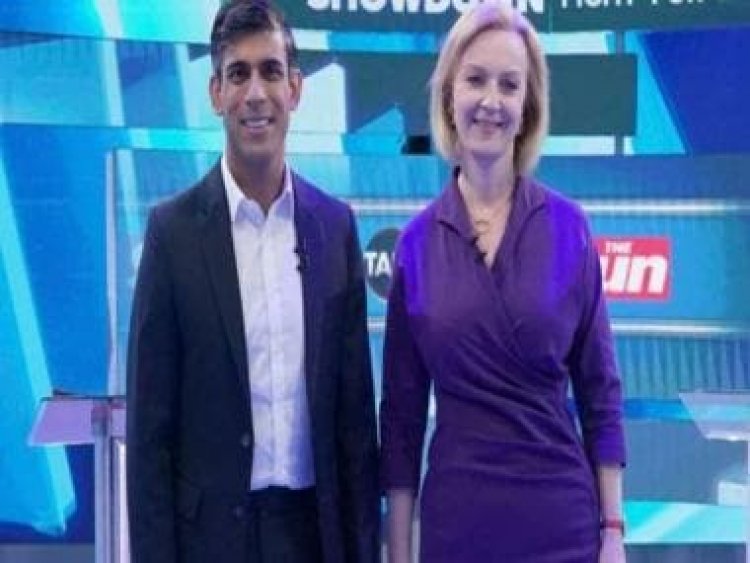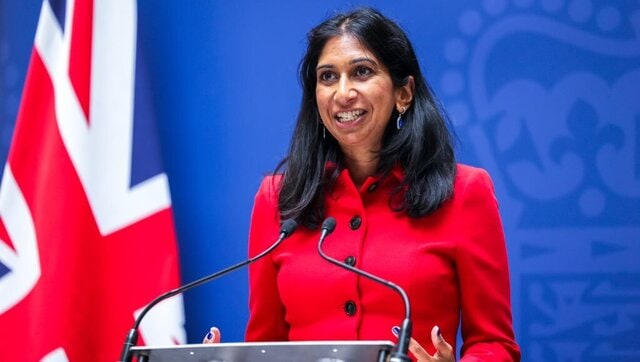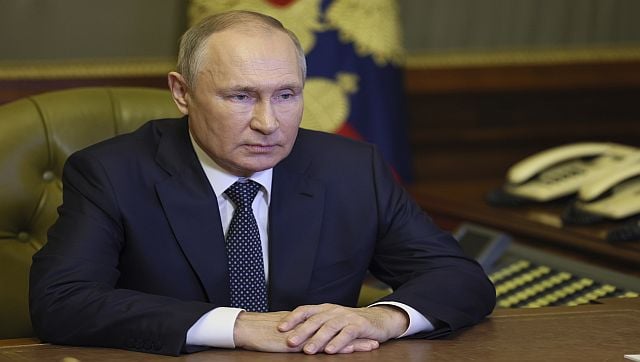Rishi Sunak waiting in the wings as Liz Truss makes a mess of Brexit-hit British economy
Rishi Sunak waiting in the wings as Liz Truss makes a mess of Brexit-hit British economy

The United Kingdom is facing an unparalleled economic and political crisis, virtually without precedent since the end of World War II. The incumbent Prime Minister, Liz Truss, who precipitated it was elected to the party leadership by eccentric Tory party members nostalgic for the empire, mostly pensioners from southeast England. The leadership victory automatically made her prime minister though she really does not have a mandate from the country at large.
Interestingly, elected Tory party members of parliament, who do have a mandate, did not want her as prime minister. They were aware of national polls that suggested the abrasive Liz Truss was unpopular with the wider electorate, which appeared to prefer Indian-origin Rishi Sunak. Like good politicians, the majority of Tory parliamentarians voted for Rishi Sunak who appeared more likely to protect their own parliamentary seats during the impending 2024 general elections. Now the Tory party leadership election result has come full circle, with many Tory party parliamentarians openly plotting a coup to replace her with Rishi Sunak. He is judiciously maintaining a pregnant silence while a momentous drama on multiple fronts unfolds in Britain.
The economic crisis engulfing Britain, the rest of Europe and indeed the world at large had its preliminary roots in the alleged Sino-American experimentation with bio-warfare jointly undertaken in Wuhan, a criminal scandal confirmed now. The intensifying economic coup de grace has since been provoked by Washington declaring war on Russia through its supine Ukrainian proxy. It is oblivious to the already dire condition of a fragile world society and its economy owing to the consequences of the Covid pandemic. The overconfident Washington military-industrial complex elite, which still imagines they alone run the world, misread the potential trajectory of the entire economic and military campaign. But the US has only just stopped short of committing uniformed NATO troops on the ground in the war they have launched against Russia, though Polish regulars in Ukrainian combat fatigues are engaged in the fighting.
In Britain, Liz Truss’s government ignored long-established national institutions, sacking key officials from the Treasury, its Ministry of Finance, to embark on a radical programme of economic policies indifferent to how markets would react. These economic policies basically comprised populist juvenilia better-suited to inebriated roustabout in the local pub. Within days of Liz Truss and her trusted Etonian Chancellor of the Exchequer, Kwasi Kwarteng, announcing their mini-budget, the markets went into a tailspin. A massive run on sterling occurred, recalling the ERM crisis of 1992, and an apocalyptic threat to pension funds, which would have impacted the bedrock of the very Tory membership that voted her into power. Such a collapse of private pensions would have potentially wiped out a large segment of the British middle class, the essential basis for the nation’s social stability and sense of selfhood. It simultaneously threatened the balance sheets of major corporations with legal responsibility for the viability of private pension funds.
Among the economic policies of the mini budget of the Chancellor of the Exchequer was a tax cut for those earning over £150,000 annually, prompting immediate disquiet across the entire political spectrum, including among her own Tory parliamentarians. Nobody could ignore the unfairness of rewarding the wealthier in the country while disregarding the struggling majority. These were the mass of ordinary people facing eye-watering rises in the cost of energy for running their homes, scheduled to increase to an eventual four-fold. This was of course the outcome of Washington’s total economic war against Russia, which had been supplying energy to Europe at reasonable cost. Once that was cut off, a massive spike in prices was inevitable. It has especially impacted developing countries and India was targeted by the Biden administration for attempting to navigate the energy crisis by buying fuel from Russia at reasonable cost. With winter approaching and the rise in projected energy demand, the boycott of Russian energy is unlikely to endure, despite the US sabotaging the Nord Stream 1 pipeline.
The Liz Truss economic policy package includes an energy price subsidy to households, entailing an unconscionable cost to the public debt, in order to limit the rise in household energy bills. But it has already reached levels impossible for most British households to pay. She pointedly refused to impose a windfall tax on British energy retailers who were making huge profits with the rise in wholesale energy prices. The confident refusal to do so seems likely to be abandoned now that she has made her trusted co-conspirator, Kwasi Kwarteng, the scapegoat for the dismal economic predicament and replaced him with one of her opponents. The new Chancellor of the Exchequer, Jeremy Hunt, has been given complete control of economic policy and cannot be removed if Liz Truss disagrees with him, without also forcing her out of office. Hunt had supported Rishi Sunak for the leadership of the Tory Party and is now the de facto prime minister of the country since he will dictate economic policy, to which all his colleagues in spending departments will be obliged to conform. In any case, Liz Truss is being described by many as being in the departure lounge.
The unfunded £45 billion tax cuts that had prompted market disarray are being rolled back hastily though not accompanied by any admission of her government’s mistaken policy overreach. The tax reduction for the wealthiest has been cancelled and the modest tax cut for everyone else seems likely to be rescinded too. But a £40 billion unfunded hole in the national budget still remains to be addressed. And thereby hangs a tale of peril that still haunts British pension funds. The government’s policy response is scheduled to be revealed in a new full budget by the end of October and a final humiliation of Liz Truss seems to be in prospect. It seems uncertain she can survive the abandonment of the entire policy package she was elected on and attempted so disastrously to implement.
Prime Minister Liz Truss continues to assert her alleged supply-side policy interventions were supposedly intended to promote economic growth, though she is doing so with progressively less conviction when she repeats it to the media. Her forlorn attempt to paint all her opponents as anti-growth is equivalent to accusing them of being against motherhood and apple pie since the dispute is over how one attempts to achieve growth, and not about the desirability of growth. In the process, she only makes herself appear like a bullied juvenile, insinuating unreal accusations against everyone in sight.
The sword of Damocles still hangs over British pension funds owing to the excesses of Liz Truss’s economic policy. They were only saved from insolvency by the last-minute intervention, in an atmosphere of crisis, by the Bank of England when markets reacted to the mini-budget of 23 September. The level of unfunded public debt, created by Liz Truss and Kwasi Kwarteng’s profligate budget, prompted a rapid rise in the yield of gilts. The situation forced some pension funds, since they have liability-driven investment portfolios of leveraged positions, to sell gilts in order to meet margin calls. It created a vicious circle because that raised yields further and created additional pressure to sell gilts, threatening a rout in the gilt market. The vulnerability of pension funds, pointed out a couple of years ago by a clever British Indian economist, was due to the fact they had effectively become bankers to the government by investing substantially in gilts, so far presumed completely safe. This investment strategy was designed to match their liabilities with incomes through predictable returns, but some funds have now lost 15 years’ worth of gains as chaos enveloped the gilt market. How this unchanged major challenge will develop in coming weeks depends on the willingness of the Bank of England to continue purchasing gilts to stabilise the market as necessary.
***
Also Read
UK gets new PM: Why Rishi Sunak lost to Liz Truss
Why UK PM Liz Truss’ troubles are a good sign for Rishi Sunak
***
In fact, the Bank of England had to throw caution to the winds four days after the budget, purchasing gilts with a commitment of £65 billion, to avert catastrophe and ending up adopting policy opposite to what it had envisaged. It had earlier intended to curb liquidity because inflation had already reached crisis levels of 10+ percent, much above the agreed established target of 2 percent. But the anticipated sharp additional impending rise in the Bank of England base rate, as a consequence of the obligation to adopt monetary laxity owing to the crisis precipitated by the Truss budget, has brought mayhem to lenders and borrowers. Those trying to buy homes found over a thousand mortgage offer packages quickly withdrawn and anyone expecting to refinance their existing mortgage is facing the prospect of vast additional costs, in excess of hundreds of pounds sterling each month. Any government help with the subsidy to energy bills will be more than wiped out by the significantly higher cost of borrowing. This much larger additional cost to borrowers is now unavoidable and will especially impact the Tory vote bank of homeowners. With house prices predicted to collapse a political setback is now guaranteed.
Basically, Britain is staring at bankruptcy, teetering between high inflation and default and being compared to vulnerable emerging economies. But the one costly counterproductive and, in the end, suicidal policy to which the entire British political class and allied sociopolitical constituency seems fully committed is prolonging the war in the Ukraine. So great is Britain’s warlike stance that its intelligence services are being linked to the bombing of the Kerch bridge, connecting the Russian mainland and Crimea, provoking the massive Russian retaliatory raids on Ukrainian infrastructure. The reality that the energy impasse needs to be resolved with the resumption of Russian energy supplies to Europe, lowering prices across the board, is virtually considered a treasonous idea to even mention. In fact, a nearly bankrupt Britain is gleefully contemplating increasing its defence budget to 3 percent of GDP.
One final nail in Britain’s coffin has been hammered in by the unexpected emergence of an ultra-Rightwing Home Secretary in the shape of Indian-origin Suella Braverman. She is of Tamil-Goan heritage, whose parents are from Kenya and Mauritius. The lady has stridently declared irrepressible nostalgia for the British empire in a recent interview, waxing eloquent on the innumerable alleged favours it bestowed on untermenschen natives. As an associated corollary, she seems to harbour some issue with India and Hindus since she has bizarrely suggested the mere presence in Leicester of immigrants of recent origin from India was the ultimate cause of the riots in that city and neighbouring Birmingham. She did not proceed to affirm a duty, as a priority, to protect all those lawfully resident in the UK and to interdict those culpable of violent rioting. Instead, an effective implicit alibi has been provided to belligerent Mirpuri Pakistanis espousing the equivalent of the slogan, sar tan se juda during the riots.

Suella Braverman’s troubling perspective on India is also evident in her accusation that Indians are the largest group of over-stayers the UK, somehow suggesting they lack integrity and trustworthiness. In fact, Indians are only over-stayers in absolute numbers and no more in percentage terms than other groups who overstay, which means they are no more inclined to evade immigration controls than others. In the process, the Home Secretary has jeopardized the signing of the Indo-British trade treaty, perhaps deliberately on behalf of Britain for some unknown reason, though it was first suggested by the former British prime minister, Boris Johnson. Some prominent British East African Asians, anticipating profitable commercial opportunities once the Indo-UK trade treaty is signed and in the queue for peerages, for helping facilitate the India-UK treaty by lobbying Delhi with shameless alacrity, are evidently distressed. Disappointingly, the Indian High Commissioner to Britain has tweeted unctuously that he seeks the ‘guidance’ of prime minister, Liz Truss, the shamed boss of the Home Secretary, herself likely destined for karmic political obscurity.
Contemporary Britain has reached a turning point like no other since the end of the Second World War. It surpasses earlier setbacks like the Suez crisis of 1956, the economic disaster of 1976, the impact of the Falklands War of 1982 and the 1992 collapse of sterling. The Suez crisis marked a dramatic end to British imperial pretensions in the Middle East, with the US asserting itself as the dominant postwar global power. Britain was forced into a humiliating climb down from its attempt to seize control of the Suez Canal in conjunction with France and Israel. The economic crisis of 1976 was the result of the inflationary pressures precipitated by the quadrupling of oil prices by Middle East producers that resulted in stagflation, excessive government borrowing and inexorable sterling devaluation. Britain had to resort to an embarrassing unprecedented resort to an IMF loan.
In 1982, Britain managed to reassert its fading imperial glory by winning a war against Argentina over the Falklands Islands, with much jingoist jubilation. Military triumph enabled prime minister Margaret Thatcher to consolidate her reactionary economic policies at home. She foisted an ideological monetarist crusade on the country and also succeeded in repressing British trade unions with unyielding police action. Despite inexplicably being hailed as the greatest British leader since Winston Churchill her sole achievement was to permanently break the back of British manufacturing owing to ideological economic policy fixations. Subsequently, the futile British attempt in 1992 to ensure that sterling remained within the lower limit set by the European Monetary Mechanism, raised interest rates to extortionate levels and forced Britain’s eventual departure from the ERM, a major British policy setback.
There have been other economic crises since, in 2002, with the dotcom bubble and the collapse of global banking in 2008, but the current situation appears to be a turning point for Britain. It now faces insuperable economic and political dilemmas that originated with the Covid pandemic and became catastrophic because Washington unleashed war in the Ukraine. The US has sought to put into action Anglo American plans, first discussed in the 1980s, to break up the USSR and Russia itself into smaller countries, which parallels their intentions towards India. These Anglo American NATO policies have unfolded once USSR conceded defeat in 1990 and retreated in bewildering disarray from eastern Europe. The Soviet leader, Mikhail Gorbachev even surrendered historic Russian territories in the Ukraine east of the Dnieper River and other vital strategic areas close to the Russian border. It would be the equivalent of India allowing the creation of an independent Punjab and Haryana, abandoning its Hindu population and also allowing the establishment of a militant Islamic state in Jammu and Kashmir. And all in the hope of gaining favourable coverage in The New York Times, Washington Post and London broadsheets like the Times and the Guardian.
As it happens, the US has not won a single war since the end of WWII, the Korean conflict ending in stalemate, with the sole exception of its triumphant invasion of miniscule Grenada in 1983. A similar disappointing anticlimax has begun to duly unfold in the Ukraine because of the decisive response of the Russian Federation under Vladimir Putin. Russia has achieved its goal of annexing Crimea, vital for its Black Sea fleet and now poised to establish a new western border at the Dnieper River. It also apparently seeks to turn the remainder of non-Russian Ukraine into a landlocked state by taking the predominantly Russian port city of Odessa. The potential consequences of the war in the Ukraine were gravely misunderstood by Europeans. They and the British caved in completely to US demands to join the futile economic and military campaign against Putin’s Russia. In the meantime, Britain’s economic plight continues to worsen and threatens to spiral out of control.

In conclusion, it should be recognised that Brexit has proved much costlier for the British economy and its people than Boris Johnson’s obscurantist buffoonery, during the campaign in its favour, conveyed to voters, who chose it by the tiniest of margins. Nor did he endeavour to organise the necessary contingency plans for the ensuing anarchic conditions that followed. It led to substantial and inordinately expensive disruption of economic relations and chaos for travelers. His successor Liz Truss’s offhand undiplomatic comments during her party leadership campaign, on vexatious issues that necessitate EU goodwill to address, especially over the Northern Ireland protocol, were inexplicably bellicose. As a result, the resolution to this highly complex issue has been rendered less probable. It has possibly hastened the day when Northern Ireland might choose re-unification with the Republic of Ireland within the European Union to escape a declining Britain and its economic woes.
The shrill tone of Liz Truss’s comments about the political aims of Scotland’s First Minister, Nicola Sturgeon, were also unduly provocative. It may prompt many in Scotland to feel they would be better off within the European Union, which they had not voted to leave. The economic damage to the national economy inflicted by the mini budget of Liz Truss has created conditions in which triumph for an independence vote is more likely in a fresh Scottish referendum, irretrievably imperiling the United Kingdom. It will surely diminish the value of any India-UK trade treaty in a truncated country, besieged by an endgame, with much less to offer by way of reciprocity, with the UK already burdened with a debt to GDP ratio of nearly 100 per cent.
The writer taught international political economy for more than two decades at the London School of Economics and Political Science. Views expressed are personal.
Read all the Latest News, Trending News, Cricket News, Bollywood News,
India News and Entertainment News here. Follow us on Facebook, Twitter and Instagram.
What's Your Reaction?



























































